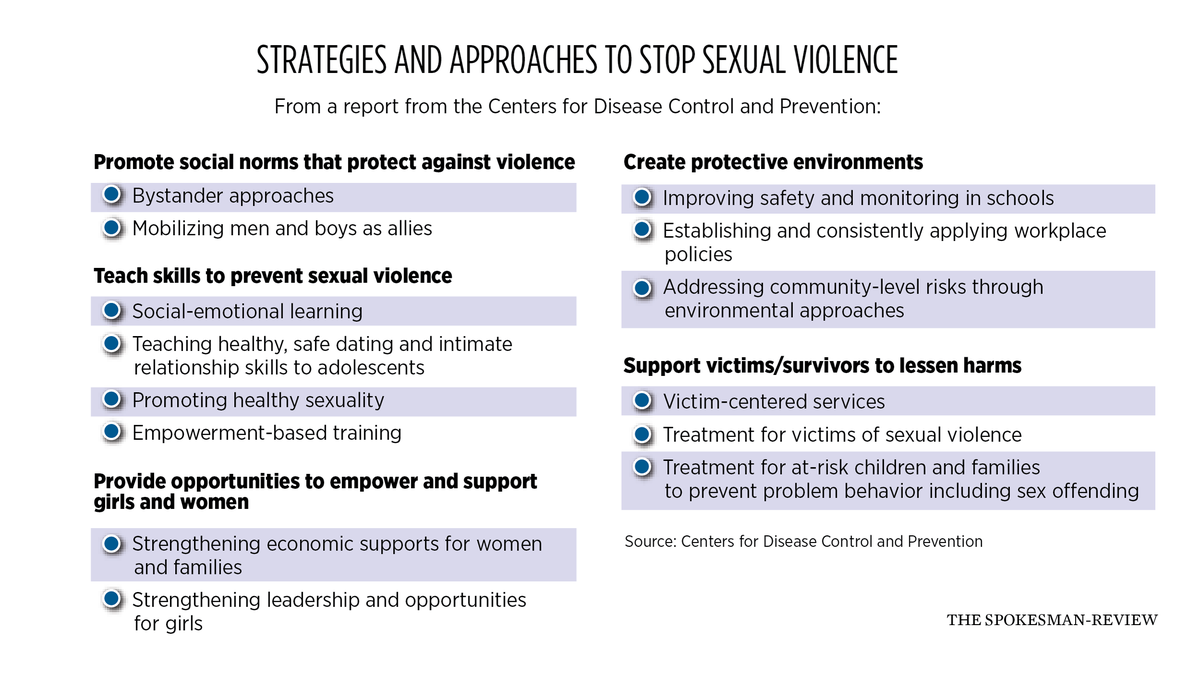‘There is someone in your life right now that is a survivor of sexual abuse’: Experts say awareness is a key to support

Everyone knows someone who has been impacted by sexual violence, local experts say.
Raising awareness is one of the goals of Sexual Assault Awareness Month, which is in its 23rd year this April. Knowing how common sexual assault is can be an important first step to supporting victims, said Roshelle Cleland, director of the victim advocacy and education program at Lutheran Community Services Northwest.
“ Just that in itself is going to make a world of a difference, because there is someone in your life right now that is a survivor of sexual abuse, whether it’s ongoing or it happened one time. Statistically, that is just true,” said Cleland, whose organization, which does not provide faith-based services, is licensed to help sexual assault survivors with counseling, victim advocacy and support through the court system. It also has a confidential 24/7 support line.
Nationwide, someone is sexually assaulted every 68 seconds, according to RAINN, the Rape, Abuse & Incest National Network. One out of every six American women has been the victim of rape of attempted rape in her lifetime. For men, it is 1 in 33.
Safe Passage, a nonprofit that supports survivors of sexual abuse in North Idaho, sees about 150 adult cases per year, with an additional 250 to 300 children through their Children’s Advocacy Center, said Amanda Krier, executive director.
Safe Passage also operates a 24/7 hotline, responds to Kootenai Health for any sexual assaults, does outreach and education and operates an emergency shelter where people can stay for up to 30 days.
In Spokane, the YWCA operates a shelter for victims of domestic violence.
One of the most important moments for survivors during their recovery is when they share their story of abuse with someone for the first time.
“That moment of disclosure is just so important,” Cleland said. “When a survivor isn’t believed in that moment, they’re questioned. They’re interrogated. They’re belittled.
“That impacts a healing journey so much in a really, really negative way, or may make it where they never disclose again and seek help, because they don’t think they’re going to be believed.”
Cleland encourages people to be patient, avoid “why” questions and to focus on listening to the survivor.
“Most importantly, understanding that you’re not going to fix it in that moment, but you can make it worse,” Cleland said.
After an initial disclosure, survivors have to decide what they want to do next. A survivor often will blame themselves, Cleland said. They are scared they won’t be believed, she added.
“They’re going to blame themselves first before anybody else has any thought about it,” Krier said. “ ‘I should have done this.’ ‘It was my fault.’ ‘I did that.’ And so I think that feels very lonely.”
If a survivor wants to report the assault to law enforcement, the responsibility often falls to the victim to advocate for themselves and to find the strength to repeat their story, Cleland and Krier said.
“The criminal justice system is not set up to support victims,” Cleland said. “It puts a lot on the victim of having to tell their story again and again.”
In Idaho, there is not a protection order for sexual assault alone; instead, those orders are tied to either domestic violence or a charged crime, Krier added.
In Washington, where more types of protection orders are available, it falls on the victim to ask a judge for the order and prove it’s needed, Cleland noted.
It’s often hard to prosecute these types of crimes, and the process is long, both said.
“I think sexual assault in general is hard, because the crime scene is someone’s body,” Krier said.
Most assailants are known to their victims, creating additional social and power dynamics for survivors to navigate, Cleland said.
Spokane police Sgt. Mike Russo said the length and complexity of the criminal justice process is a huge part of why advocates and other resources are so important to help survivors.
“Survivors need support,” Russo said. “We don’t want survivors to get lost.”
Russo, who works in the Special Victims Unit, said they have to be collaborative with Lutheran Community Services and with Partners with Families and Children, which provides additional services to victims. All Spokane police officers are trained in trauma-informed victim interviewing, which is research-based and seeks to not retraumatize people as they share their experiences.
Both forensic- and technology-related data can take a long time to process , Russo noted. The unit is understaffed, he added, with eight detectives working between 10 and 16 cases at a time.
“The volume is sort of quite impressive and concerning,” he said.
The unit has to triage cases based on a variety of factors, he said. Russo still encourages victims to come forward, even if they don’t end up pressing charges or taking the case all the way through the criminal justice system.
“We need to hear your story and try to get you in touch with resources that might help,” he said.
Washington has taken steps in recent years to make the criminal justice system more supportive of victims, like increasing the statute of limitations for many sex crimes in 2019 or ending the backlog of untested rape kits, which resulted in seven cases being solved in Spokane County.
Advocates agree there is a long way to go.
Both Safe Passage and Lutheran Community Services offer largely free services and supports to victims, but additional funding is always needed, both organizations say.
The first step for the community, Krier said, is just knowing how prevalent sexual assault is.
“I feel like acknowledging the fact that it exists, and it’s not OK in our community,” Krier said, is the right place to start.